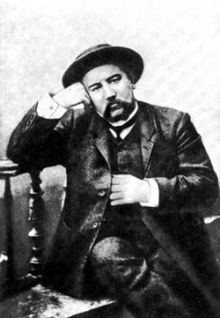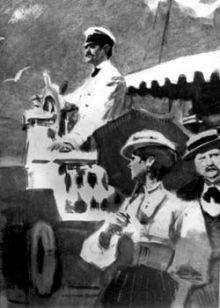According to a time-honored truism, man becomes what he is through exposure to adverse circumstances and struggle with an alien environment. The young, 24-year-old retired Second-Lieutenant Aleksandr Kuprin, who arrived in Kyiv in August 1894 with the goal of devoting himself to journalism and especially literature, experienced this eternal truism firsthand. Life itself was his teacher.
However, the fascinating trait that the future great writer possessed — described by Kostiantin Paustovsky as “his undying ability to blaze up from the slightest brush with poetry” — helped him to endure the trials of poverty, the vulgarity of daily life, unbridled malice of those who envied him, and, finally, the trials of fame. Most notably, it was on Ukrainian soil that Kuprin became a wordsmith and formed his personality. The memorial plaque on a building on vul. Sahaidachnoho in Kyiv is a humble tribute of respect for this man, who devoted an entire series of splendid works to Ukraine, its people, and unparalleled nature. The scope of Ukrainian regions reflected in Kuprin’s works is impressive: from Volyn to Kyiv and from Odesa to the Donbas. Without the plethora of worldly impressions that he accumulated during the years of his “Ukrainian Odyssey” there would have been no Kuprin as we know him.
YEARS OF STUDY
In mid-1890 young Kuprin graduated with honors from the Junker School of St. Aleksandr in Moscow. Fresh out of school, he was commissioned to the 46th Dnipro Infantry Regiment based in the township of Proskurove, Podillia gubernia, now Khmelnytsky oblast in Ukraine. The 20-year-old junker left behind years of fatherless childhood (he was raised by his mother, princess Liubov Alekseevna Kulunchakova, a woman of rare wisdom and tremendous willpower), bitter humiliations at a Moscow school for orphans, followed by years of study at the Cadet Corps. “My childhood was forced into army issue uniform,” Kuprin rightly noted.
But there was another aspect to his life. In 1889, one year before his graduation from the military school, Aleksandr published his first story under the penname “Al. K-rin,” entitled “Posledniy debiut” [The Last Debut], which was weak and sentimental in a youthful way. The strict school administration reacted harshly by placing Kuprin in a disciplinary cell for this blatant violation of discipline. At the time cadets were severely punished for “scribbling,” a statutory offence. Nonetheless, the young free- thinker’s desire to write was indestructible. During his service with the regiment in the backwater township of Proskurove (which he described as “the back of beyond: always muddy, with pig herds in the streets and mud huts of clay and dung” in his 1894 story “K slave” [Toward Fame]), and later in the neighboring Podillia townships of Volochysk and Husiatyn, Kuprin was gradually turning into the future brilliant wordsmith, reflecting on his meetings with new people and new impressions that life was bestowing on him. Life was never colorless for Kuprin. More than anybody else he craved its bright colors. He would have never written his “Poyedinok” [Duel] had it not been for his service in the godforsaken garrisons in Podillia.
After securing retirement from the service, which cost him considerable effort, Kuprin arrived in Kyiv in 1894. This is how Kuprin was described by a staff member of the newspaper Zhyzn i iskusstvo [Life and Art] (Kuprin cooperated closely with this newspaper, along with Kievskoe slovo [Kiev Word] and Kievlianin [Kievan], at the start of his journalistic career): “One day a very young man sporting peach fuzz instead of a beard and moustache, and a skimpy jacket entered our editorial office and offered his story. The item he left immediately radiated great talent, and when the author came the following day to hear our opinion, he got the warmest reception, after which he became a staff writer. He was Aleksandr Ivanovich Kuprin, who had settled in Kyiv a short time before that. The editors had a high opinion of his natural talent and dubbed him a ‘belletrist by God’s will’.”
Kuprin recalled the years of his youth in Kyiv (1894-1896) in his 1913 autobiography: “I found myself in the position of a schoolgirl, who had been left in a forest thicket without clothing, food, or compass. The toughest part was that I had no scholarly or worldly knowledge.” This is what another famous writer, Ivan Bunin, who was a close friend of Kuprin’s, said about the “reporter’s school” that young Kuprin experienced in Zhyzn i iskusstvo, Kievskoye slovo, and Kievlianin: “After he left the regiment, he lived from odd jobs, including a job at some Kyiv-based ‘little newspaper’ [Bunin’s disparaging description of the newspaper is hardly justified — Author], doing not only journalistic work, but also writing ‘tales.’ He told me that he sold those ‘tales’ for ‘pennies, of course, but very easily,’ and composed them even more easily — ‘on the run, on the fly, and whistling’ — meeting the editor’s and readers’ expectations by virtue of his talent.”
Bunin was obviously exaggerating. Among the ‘tales’ that he mentioned are such brilliant works as “Doznaniye” [Interrogation] (1894), which describes the horrible corporal punishments meted out by the military, or “Sviataia liubov” [Sacred Love] (1895), which conveys Kuprin’s important belief that any love, even unrequited, is a priceless gift from fate. Speaking of Kuprin’s accomplishments as an essayist and reporter for Kyivan newspapers, I should mention his collection Kievskie tipy [Characters of Kyiv] whose first edition came out in 1896. Such essays as “Dneprovskii moreplavets” [Seafarer on the Dnipro], “Vor” [Thief], “Student-dragun” [Dragoon Student], and “Khudozhnik” [Artist] fully reflect such aspects of Kuprin’s talent as his ability to laconically and aphoristically present to the reader the most prominent character traits of the people he wrote about, and accurately convey their language, behavior, and appearance. Even though many of these miniatures are cursory sketches, the future writer’s keen powers of observation, satirical gift, and ability to empathize with human suffering account for the collection’s inimitable color, which captivates readers to this day.
ADULTHOOD
Kuprin “was always greedy to try and test everything life could offer” (his own words). Until his death he was deeply convinced that a writer, if he is a genuine writer, must be perfectly familiar with his subject. When Kuprin wrote about the life of the military or fishermen, circus performers or miners, he knew those people’s lives inside and out. The list of occupations that the writer mastered in his youth is striking: he managed a construction site, grew tobacco in Volyn gubernia, served in an engineering office, was a psalm reader, an actor in a theater in Sumy (March-September 1898, which represents another “Ukrainian page” in the writer’s biography), a furniture mover, and unloaded water melons. This experience contributed to his creative maturity, providing him with countless profoundly rich impressions without which he would have never created his best works.
An attentive reading of such famous works by Kuprin as “Molokh” [Mountain Devil], “Olesia,” “Gambrinus,” “Yama” [Pit], “Poedinok” [Duel], and “Listrigony” reveals highly accurate and artistically brilliant reproductions of real-life settings from various regions of Ukraine (Volyn, Kyiv, the Donbas, Podillia, Odesa, the Crimea, etc.). Remaining true to his principle of “penetrating” reality down to its smallest details, in his novels and stories of the “Polissia cycle” (“Olesia,” “Lesnaia glush” [Thicket of the Woods], “Konokrady” [Horse Thieves], “Zapechatannye mladentsy” [Packaged Babies], etc.) Kuprin makes liberal use of Ukrainian words (“zlodiy” [thief], “khytnuty” [to rock], “pochekaite” [wait up], “zazhdit” [hold on], “panove hromado” [a polite form of addressing the community], “hukaty” [to call out], etc.) and does so correctly and appropriately. The accuracy of his highly specific descriptions is also a distinguishing feature of his work. More importantly, when Kuprin displays his skill of artistic generalization (for example, the corps commander in “Duel” shows traits of the then famous General Drahomyrov of Kyiv), he uses materials collected during the years of residence in Ukraine.
Kuprin readily admitted: “I am no good as a teacher of life. To many people I am no more than a good friend and interesting narrator.” This was his modesty speaking. In reality, the works of this wonderful writer, who teaches us to love life (Kuprin often compared life to a river) to have pure and noble feelings, and exercise spiritual steadfastness, remain a precious asset of world culture.








